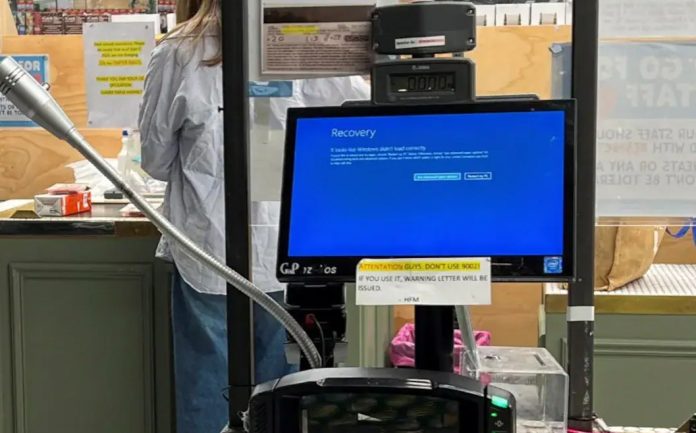Mumbai, July 19: A global Microsoft outage on Friday led to disruptions in airline operations, flight cancellations and long queues of passengers outside airports and at check-in counters.
Follow the Daily Excelsior channel on WhatsApp
Services like booking, check-in and boarding processes, including issuance of boarding passes, are being carried out manually, which is taking longer than expected time and leading to long queues at airports.
“The Microsoft/CrowdStrike outage has taken down most airports in India. I got my first hand-written boarding pass today,” said IndiGo passenger Akshay Kothari in a post on X displaying his manual boarding pass.
According to preliminary data by aviation analytics firm Cirium on the global IT disruption, 56 flight were cancelled out of 3,652 flights scheduled from Indian destinations. This does not include inbound flights to India.
Union Civil Aviation Minister Ram Mohan Naidu assured the passengers that the ministry and Airports Authority of India (AAI) are actively managing the situation using manual methods to ensure minimal disruption.
“We have instructed all airlines and airport authorities to keep passengers informed about their flight status and provide necessary assistance,” Naidu said.
Minister of state for Civil Aviation Murlidhar Mohol said the ministry and aviation safety regulator DGCA are closely monitoring the situation.
The minister said that instructions have been issued to private airlines to promptly inform passengers about the disruptions.
According to an airline executive, the web check-in feature remaining temporarily unavailable for passengers across airports, led to chaos. The disruption in services started from 1040 am, according to him.
The impact was more on passengers flying out of high-density airports like Delhi, Mumbai, Bengaluru and Chennai.
“A global outage with the Navitaire Departure Control System (DCS) has been affecting operations of some airlines across their network, including BLR Airport since 10:40 IST on July 19, 2024. Indigo, Akasa, and SpiceJet in T1 and Air India Express in T2 are among the impacted airlines,” a Bengaluru airport spokesperson said.
The Common Use Terminal Equipment (CUTE) and Common Use Self Service (CUSS) systems are also experiencing disruptions, the airport operator said adding that in response to this situation, IndiGo, Air India Express, SpiceJet and Akasa have taken proactive measures by initiating manual check-ins to ensure minimal disruption to passengers and flight schedules.
“Due to a major global system outage, all gate screens at DEL (Delhi airport) blank. Flights are being held at the gate. Some gates boarding pax (passengers) and holding on board, some flights holding pax at gate itself, which is better. Seems to be impacting many airports and airlines,” Sanjiv Kapoor, executive vice-president (strategies) of Saudia Airlines and former CEO of Jet Airways 2.0, said in a post on X.
Earlier in the day, IndiGo said its systems were impacted by the Microsoft outage and during this time, booking, check-in, access to boarding pass, and some flights were impacted.
Services of budget carrier Akasa were also impacted.
“Due to infrastructure issues with our service provider, some of our online services, including booking, check-in and manage booking services will be temporarily unavailable. Currently we are following manual check-in and boarding processes at the airports,” Akasa said in a post on X.
SpiceJet also said that it was experiencing technical challenges with the service provider affecting online services including booking, check-in, and managing booking functionalities.
” As a result, we have activated manual check-in and boarding processes across airports,” the airline said.
Amid a massive global outage that hit operations of airlines, banks and businesses across the globe, Microsoft on Friday said it is aware of the issue affecting Windows devices due to an update from a third-party software platform.
A Microsoft spokesperson said: “We anticipate a resolution is forthcoming. We’re aware of an issue affecting Windows devices due to an update from a third-party software platform.” (Agencies)


